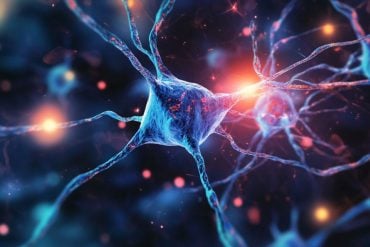Summary: Modifying lifestyle to include more healthy options could help to relieve pain symptoms in multiple sclerosis, a new study reports.
Source: Frontiers.
No smoking, regular exercise, healthy weight and balanced diet could help people with multiple sclerosis to manage their pain.
A healthy lifestyle of regular exercise, no smoking and healthy diet is associated with lower pain in people with multiple sclerosis (MS), finds a study published in open-access journal Frontiers in Neurology. The findings add to a growing body of evidence that modifiable lifestyle factors can help manage MS symptoms.
“Our study found strong associations between lifestyle and pain in people with multiple sclerosis,” says Claudia Marck, one of the paper’s authors. “Smokers are more likely to experience pain, and those that do regular exercise seem less likely to experience pain. We also see strong links between pain and the prevalence of anxiety and depression.”
An estimated 2.5 million people worldwide have multiple sclerosis. The condition affects the nervous system, often causing chronic pain and a lack of mobility. The pain is normally treated with painkillers, but these can have side effects, are expensive and do not treat the cause of the pain.
In a search for ways to tackle the cause, Marck and colleagues at the University of Melbourne, Australia, investigated how modifiable lifestyle factors are associated with pain in MS — a relationship that has not previously been examined in detail.
The team surveyed more than 2,500 people with multiple sclerosis from across the world on their symptoms, lifestyle and social demographics, then looked for patterns in the responses.
Smokers were found to be twice as likely to report substantial pain than non-smokers with MS.
“With smoking, studies have shown a detrimental feedback loop,” explains Marck. “In the long term, smoking has been reported to increase the likelihood of chronic pain. However, in the short term it dulls the pain, so this may motivate people with pain to smoke. Also, smokers, and especially those with depression, find it particularly hard to quit, as stopping smoking can initially increase pain sensitivity.”
As in previous studies, the analysis also showed that people with multiple sclerosis who engage in more physical activity are less likely to experience pain.
“This association can be interpreted in two ways,” says Marck. “As you might imagine, people are less likely to exercise if they are in pain. But on the other hand, exercise has been shown many times over to be beneficial in terms of pain symptoms. Increased physical activity can increase pain threshold and tolerance, and so reduce the experience of pain.”
In people with MS, the nerves lose their protective myelin coating. Previous studies have shown that exercise has neuroprotective and neuroregenerative effects. Marck adds, “This suggests that exercise can potentially reduce pain caused by damage to the nerves as it promotes brain and nerve health.”
Despite this evidence, Marck is quick to note, “People with MS and pain may be more likely to fear physical activity and avoid doing it as it may cause them more pain. In avoiding physical activity, it is likely that they are making their health outcomes worse in the long term.”
The study also found strong links with pain and the prevalence of anxiety and depression — two conditions for which people with multiple sclerosis are at higher risk of developing.

The team cannot claim that lifestyle factors are the cause of pain or explain the relationship between pain and anxiety or depression. However, due to the strong association between lifestyle and pain observed, and a large body of evidence pointing to overall health benefits, Marck advises that those with MS try exercise therapy, smoking cessation and a healthy diet, and to try to have a healthy weight.
She concludes, “Maintaining a healthy lifestyle can be hard for us all. For those with MS it is even more important as they have a higher risk of having poorer health and developing other conditions such as cardiovascular problems and diabetes. For those who struggle to initiate or maintain healthy lifestyle behaviors, seeking the support of a health professional will be invaluable.”
The team are conducting further studies to understand the links between exercise and pain in those with MS. It is also hoped that these preliminary findings will spark further research and intervention studies to substantiate these observations.
Funding: Funding provided by Bloom Foundation, Horne Family Charitable Trust, National Health and Medical Research Council.
Source: Emma Duncan – Frontiers
Image Source: NeuroscienceNews.com image is in the public domain.
Original Research: Full open access research for “Pain in People with Multiple Sclerosis: Associations with Modifiable Lifestyle Factors, Fatigue, Depression, Anxiety, and Mental Health Quality of Life” by Claudia H. Marck, Alysha M. De Livera, Tracey J. Weiland, Pia L. Jelinek, Sandra L. Neate, Chelsea R. Brown, Keryn L. Taylor, Fary Khan, and George A. Jelinek in Frontiers in Neurology. Published online September 5 2017 doi:10.3389/fneur.2017.00461
[cbtabs][cbtab title=”MLA”]Frontiers “Healthy Lifestyle Linked to Lower Pain in MS Sufferers.” NeuroscienceNews. NeuroscienceNews, 2 October 2017.
<https://neurosciencenews.com/pain-ms-lifestyle-7641/>.[/cbtab][cbtab title=”APA”]Frontiers (2017, October 2). Healthy Lifestyle Linked to Lower Pain in MS Sufferers. NeuroscienceNews. Retrieved October 2, 2017 from https://neurosciencenews.com/pain-ms-lifestyle-7641/[/cbtab][cbtab title=”Chicago”]Frontiers “Healthy Lifestyle Linked to Lower Pain in MS Sufferers.” https://neurosciencenews.com/pain-ms-lifestyle-7641/ (accessed October 2, 2017).[/cbtab][/cbtabs]
Abstract
Pain in People with Multiple Sclerosis: Associations with Modifiable Lifestyle Factors, Fatigue, Depression, Anxiety, and Mental Health Quality of Life
Background: People with multiple sclerosis (MS) often experience pain, which can interfere with mobility, employment, and quality of life (QOL).
Methods: This cross-sectional study explored associations between pain, demographic, disease, and modifiable lifestyle factors in an international sample of people with MS recruited online.
Results: Substantial pain, of moderate/severe intensity and interfering at least moderately with work/household or enjoyment of life in the past 4 weeks, was reported by 682/2,362 (28.9%). Substantial pain was associated with fatigue (odds ratio (OR): 6.7, 95% confidence interval (CI): 4.9,9.3), depression (OR:4.0, 95% CI:3.2,5.1), anxiety (OR:2.4, 95% CI:1.9,2.9), and lower mental health QOL (Mean Difference: −14.7, 95% CI:−16.6,−12.8). Regression analyses showed that smoking (OR: 2.0, 95% CI:1.35,2.87) and obesity (OR:2.1, 95% CI: 1.5,2.8), moderate alcohol use (OR: 0.7, 95% CI:0.5,0.9), moderate (OR 0.7, 95% CI: 0.55,0.98) or high (OR 0.6, 95% CI: 0.4,0.8) physical activity level, and healthy diet (OR 0.8, 95% CI: 0.75,0.95, per 10 points) were associated with substantial pain.
Conclusion: Our results show clear associations with modifiable lifestyle factors and substantial pain in MS. These factors are already considered in the prevention and management of pain in other populations but have not previously been considered in MS. Conversely, pain and associated common MS comorbidities, such as depression, anxiety, and fatigue, may hamper efforts to start or maintain healthy behaviors. Strategies to overcome these barriers need to be considered. Further research should clarify the direction of these associations.
“Pain in People with Multiple Sclerosis: Associations with Modifiable Lifestyle Factors, Fatigue, Depression, Anxiety, and Mental Health Quality of Life” by Claudia H. Marck, Alysha M. De Livera, Tracey J. Weiland, Pia L. Jelinek, Sandra L. Neate, Chelsea R. Brown, Keryn L. Taylor, Fary Khan, and George A. Jelinek in Frontiers in Neurology. Published online September 5 2017 doi:10.3389/fneur.2017.00461






